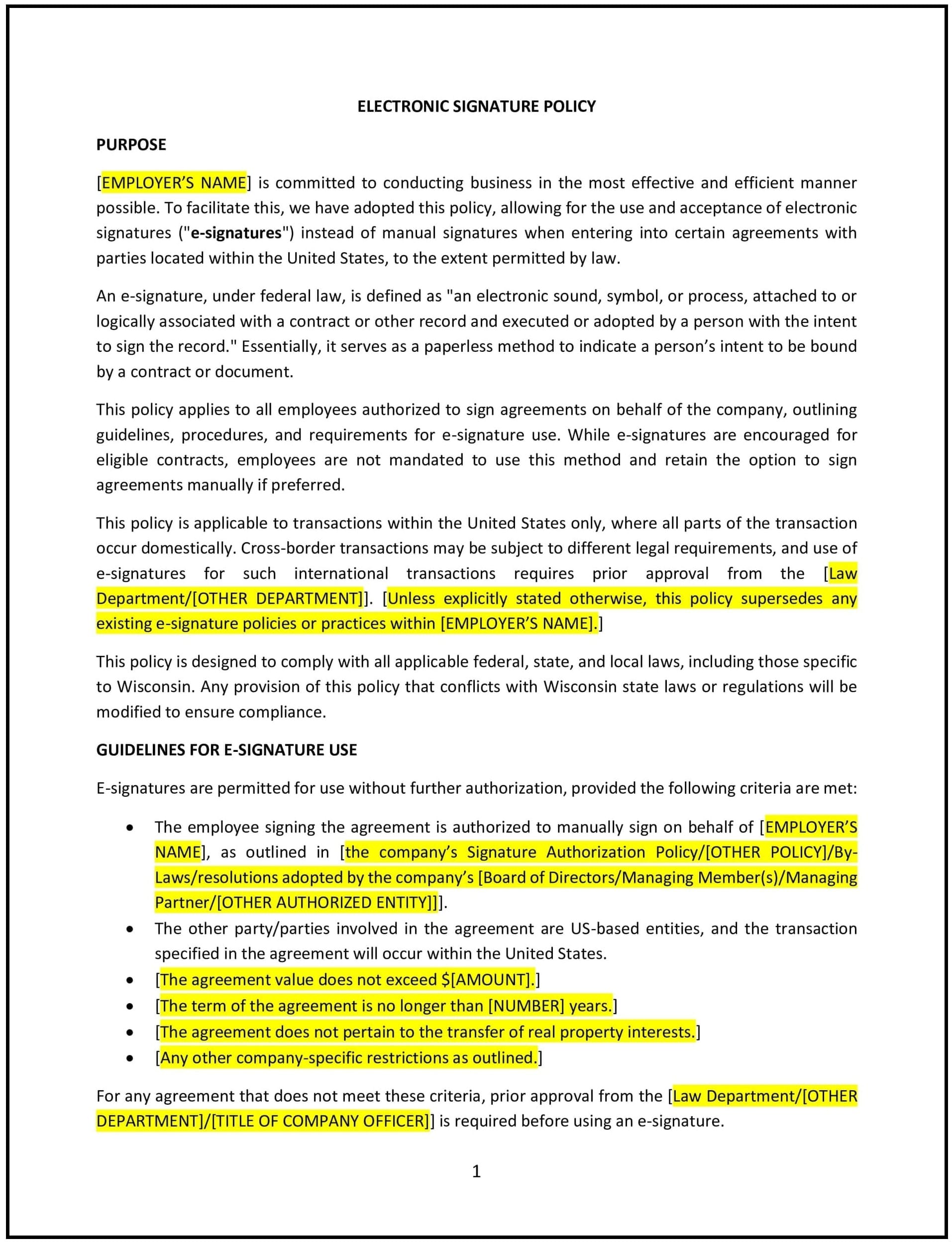Electronic signature policy (Wisconsin): Free template
Got contracts to review? While you're here for policies, let Cobrief make contract review effortless—start your free review now.

Customize this template for free
Electronic signature policy (Wisconsin)
An electronic signature policy helps Wisconsin businesses define the use of electronic signatures for contracts, agreements, and other business documents. This policy outlines when and how electronic signatures may be used, the security measures in place to protect them, and the legal validity of electronic signatures in accordance with Wisconsin state laws and federal regulations.
By implementing this policy, businesses can streamline document execution, reduce reliance on paper documents, and support compliance with legal standards for electronic signatures.
How to use this electronic signature policy (Wisconsin)
- Define the use of electronic signatures: Specify the types of documents that may be signed electronically, such as contracts, employee agreements, vendor contracts, or internal company policies.
- Outline acceptable electronic signature methods: Clarify which methods of electronic signature are acceptable, such as typed signatures, scanned signatures, or digital signature technologies that use encryption (e.g., DocuSign, Adobe Sign).
- Improve compliance with legal requirements: Ensure that the electronic signature method complies with Wisconsin state laws and the federal Electronic Signatures in Global and National Commerce Act (ESIGN Act), which recognizes the legal validity of electronic signatures.
- Maintain security and authenticity: Specify the security measures that will be used to authenticate electronic signatures, such as encryption, audit trails, or verification processes, to ensure that signatures are genuine and tamper-proof.
- Clarify the scope of authority: Outline who within the organization is authorized to use electronic signatures and on which types of documents. The policy should specify if certain individuals, such as senior management or department heads, have exclusive authority for signing specific documents.
- Address the storage of signed documents: Define how electronically signed documents will be stored and retained, including whether they will be saved electronically or in a secure document management system. Ensure that signed documents are easily accessible for future reference.
- Provide for consent: Ensure that all parties involved in the signing process consent to using electronic signatures and understand the legal implications of electronically signing a document.
- Outline the process for disputing signatures: Specify the process that employees or external parties should follow if they dispute the validity of an electronic signature or a signed document.
Benefits of using this electronic signature policy (Wisconsin)
This policy offers several benefits for Wisconsin businesses:
- Increases efficiency: Electronic signatures speed up the process of signing contracts and other documents, eliminating the need for physical paperwork, mailing, or in-person signatures.
- Reduces costs: By eliminating paper and postage costs, businesses can reduce administrative expenses and the environmental impact of paper-based processes.
- Improves legal compliance: The policy ensures that the business adheres to Wisconsin and federal laws governing electronic signatures, reducing the risk of legal challenges.
- Enhances security: Electronic signature technologies provide enhanced security features, such as encryption and audit trails, making it more difficult for documents to be altered or forged.
- Promotes business flexibility: Electronic signatures allow businesses to execute documents from any location, providing greater flexibility and convenience for employees and clients.
- Streamlines record-keeping: By transitioning to electronic signatures, businesses can maintain digital records of signed documents, improving document management and retrieval processes.
Tips for using this electronic signature policy (Wisconsin)
- Communicate the policy clearly: Ensure that all employees are aware of the electronic signature policy and understand the processes for signing documents electronically. Provide training for employees who will be using electronic signatures.
- Ensure secure signature methods: Use trusted electronic signature platforms that offer strong authentication, encryption, and audit trails to protect the integrity of signed documents.
- Review contracts regularly: Ensure that any documents requiring electronic signatures are reviewed for compliance with the policy, ensuring that the signature methods are valid and secure.
- Track signed documents: Use a document management system that tracks all electronically signed documents, providing easy access and accountability for both parties involved in the transaction.
- Review and update regularly: Regularly review the policy to ensure that it remains compliant with Wisconsin state laws, the ESIGN Act, and evolving technologies and best practices.